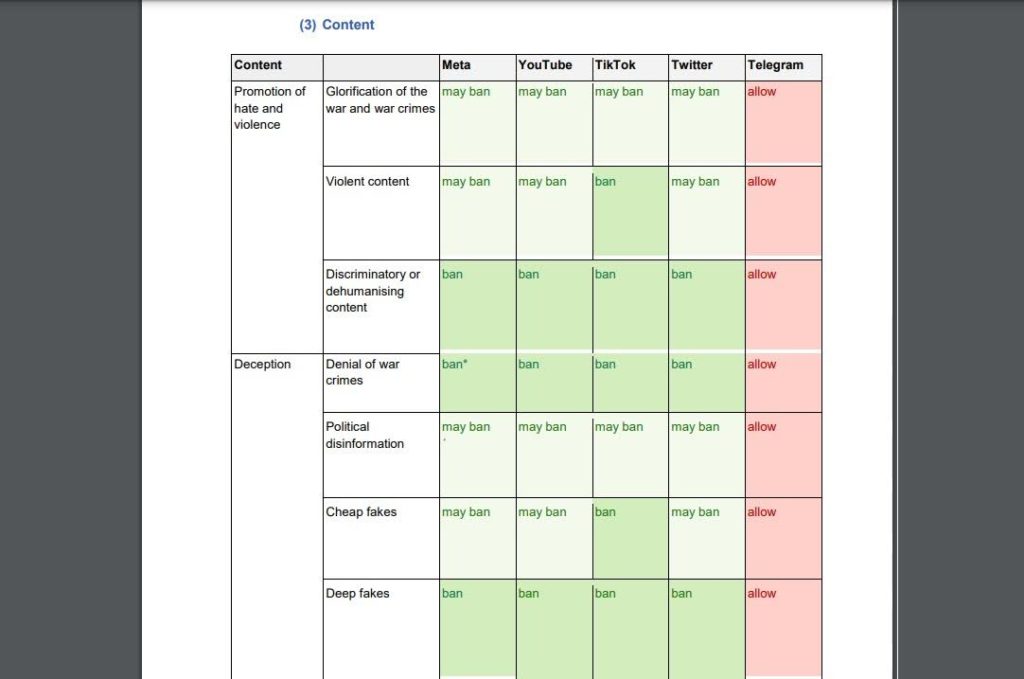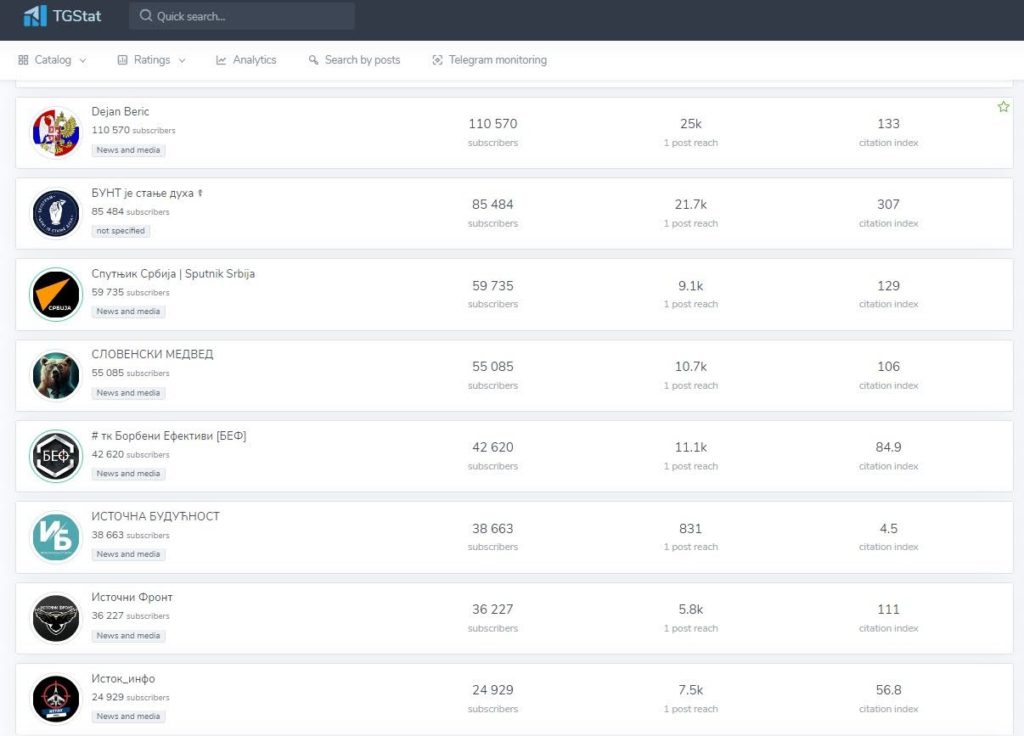Original article (in Serbian) was published on 10/6/2024; Author: Marija Vučić
In recent years, Telegram has gained popularity among those who hold “alternative” views on topics like the pandemic, the migrant crisis, and the war in Ukraine. On this social network, many skeptics, distrustful of science, institutions, or mainstream media, gather information from obscure internet sources. Unlike platforms such as Facebook, Telegram has significantly looser content regulations. According to Bloomberg, the EU is currently assessing whether Telegram can be brought under the Digital Services Act, which enforces strict rules within the Union. Some anti-globalist groups in Serbia are labeling these efforts as censorship.
The web portal Nulta tacka reports that their journalists “obtained a Bloomberg report” suggesting that the EU is preparing to censor Telegram. However, the term “obtained a report” might imply thorough journalistic effort, when in reality, it was merely a matter of finding an article via Google. They located a Bloomberg article from May 28, titled “EU Explores Whether Telegram Falls Under Strict New Content Law.”
“As Nulta tacka discovers, Brussels is currently considering whether to subject the Russian-made platform to its laws on “disinformation” (…) EU officials are considering listing Telegram as a “very large online platform” which would include this application in those subject to strict censorship”, writes Nulta tacka in the text “The EU Plans to Carry Out General Censorship of the Telegram Application.”
In the article with the controversial title, Nulta tacka cites Bloomberg, stating that EU authorities are trying to assess the number of Telegram users in Europe to determine if the platform should be subject to the Digital Services Act (DSA), which applies throughout the EU. However, describing this as censorship, as the title implies, is misleading.
What Is It About?
It is true that the website Bloomberg announced at the end of May that European regulators are questioning Telegram’s claims that this platform has 41 million users in the EU.
The assumption is that there are more – and if this is confirmed, Telegram will have to change the way it works.
Namely, the DSA (Digital Services Act), which, among other things, regulates content moderation, applies to all platforms that have more than 45 million users.
What is DSA?
The Digital Services Act (DSA), as stated on the website of the European Commission, is a regulation of the European Union adopted to “create a safer and more transparent environment for users and companies.” Its main goal is the fight against illegal and harmful activities on the Internet, including disinformation, as well as better protection of users and their rights. It was adopted in October 2022, and has been in force since February of this year.
The platforms covered by the law are divided into two categories: Very Large Online Platforms (VLOPs) and Very Large Online Search Engines (VLOSEs). They currently include 19 companies, among others, AliExpress, Amazon, Apple, Google, LinkedIn, Meta, Microsoft, TikTok, and Twitter. All these companies must comply with the rules prescribed by the DSA.
What Does DSA Prescribe?
The DSA stipulates that these companies are obliged to combat several practices: illegal online content, including illegal goods and services, endangering minors, advertising content and services to children, using misleading advertisements, cyber violence, disinformation and election manipulation. Still, with some restrictions.
“These measures must be carefully balanced so as not to jeopardize freedom of expression, and are subject to independent audits”, the European Commission states.
When it comes to disinformation on these networks, based on this law, a code on disinformation was written, which was signed by more than 30 organizations, including some of the mentioned big platforms like TikTok. They pledged to demonetize channels that spread disinformation, work closely with fact-checkers and provide researchers with access to data.
In other words, all these companies must fight against content that is determined to be manipulative, to misinform, to mislead users and potential consumers, and to influence the freedom of the electoral process. In addition to the obligation to “ban” such users and accounts, that is, to suppress or completely shut down, platforms are, as stated on the European Commission’s website, also obligated to be transparent in this regard and to regularly publish reports on their work.
Is It Censorship?
Regulation and abolition of manipulative content are not the same as censorship – preventing the free flow of information of public interest for the sake of one’s private interests and motives. The European Commission states that the goal is to establish a “delicate balance between the rules against illegal and problematic content and the freedom of expression and information.”
To ensure that the moderation of content – which is harmful, manipulative or violent – does not violate the right to freedom of expression, the European Commission has established a couple of mechanisms. First, users can challenge the platform’s decisions to remove some content, including decisions based on terms of use.
“This ensures that decisions are not arbitrary and allows users to protect their online presence. Users can complain directly to the platform, choose out-of-court dispute resolution or seek compensation before the courts,” the EC website states.
Also, the DSA obliges companies to be transparent regarding content moderation. Here too, the user, whose presence on the networks is limited or suspended, has the right to complain, and the platform itself is obliged to find out why the user was excluded. If the audit determines that the company has violated freedom of expression, “it will be held responsible.”
For those who violate this law, the European Commission can impose fines of up to 6 percent of their annual turnover. As a last resort, if the violation of the law continues and serious harm is caused to users, the Commission can ask individual countries and national courts to restrict the use of the platform in that country temporarily.
What Is the Problem With Telegram?
This Russian chat app and social network still doesn’t fall under the DSA because it officially has fewer than 45 million users in the EU.
According to the latest Bloomberg report, European regulators are closely monitoring Telegram, which is expected to disclose its user numbers soon. Should these exceed the prescribed threshold, the platform will be required to enforce stricter content regulation.
This is important to European regulators since Telegram gained a lot of popularity with the war in Ukraine. According to a 2022 European Commission document addressing the spread of Russian disinformation on social networks, Telegram permits a significantly higher volume of problematic content compared to other platforms. This includes the glorification of war and war crimes, violent and discriminatory content, denial of war crimes, political disinformation, and the circulation of deepfake videos.

Many users migrated to Telegram from Facebook and other platforms during the pandemic because those platforms started to actively ban content involving manipulation, disinformation, pseudoscience, and “alternative” versions of reality not supported by evidence.
The reason why Russian networks such as Vkontakte and Telegram are attractive to many is precisely the absence of regulation, which users interpret as free expression, as opposed to the “censorship” of large companies such as Meta or YouTube.
Migrations have especially intensified since the beginning of the war in Ukraine, and this can be seen in the example of Serbia: until then, a relatively marginal network, Telegram has become an influential place in the last few years where a radical, pro-Russian part of the citizens gathers.
On the list of the most influential and popular channels in the Serbian language on this network, there are mainly pro-Russian ones that promote narratives about a “special military operation”, Ukronazis and the denial of Ukrainian sovereignty.
The most popular channel in Serbia is the pro-Russian volunteer Dejan Beric’s channel, which has more than 110,000 followers. Beric is the man who organizes the recruitment of men from Serbia and sends them to the Russian-Ukrainian fronts, even though participation in foreign wars is a criminal offense under domestic laws.




